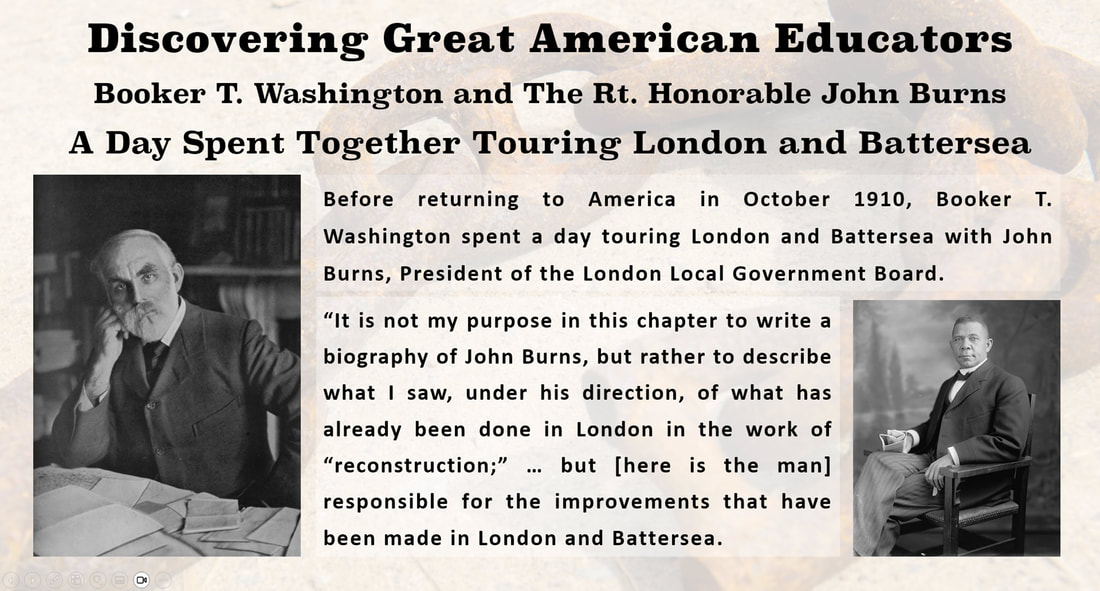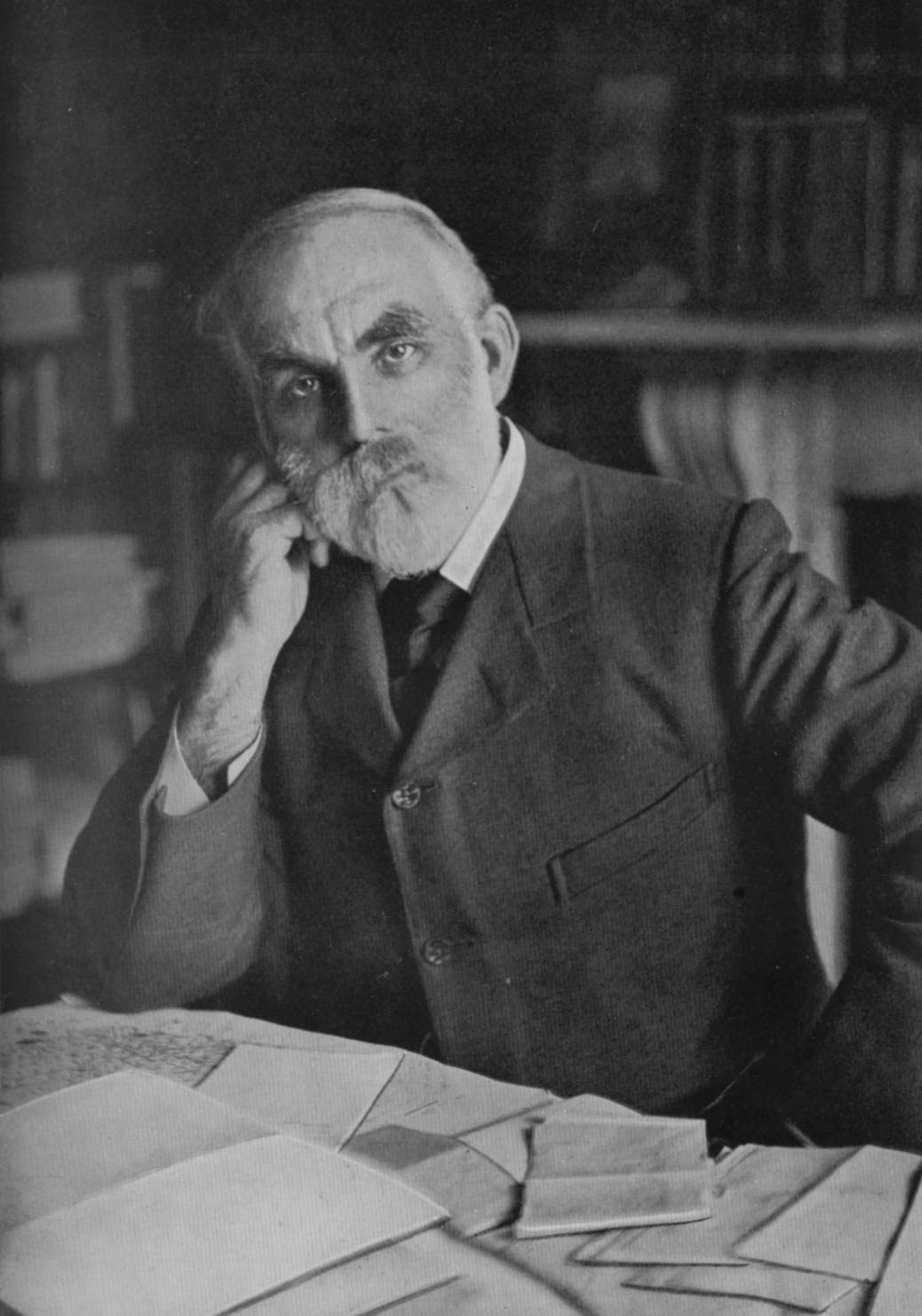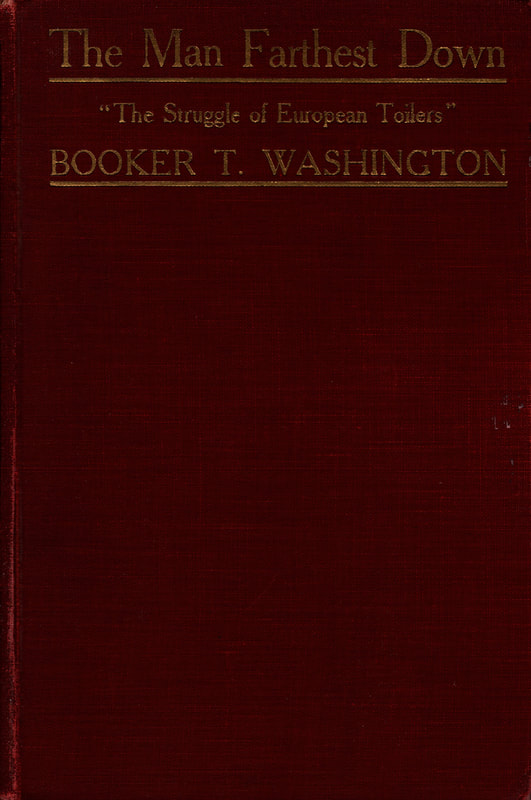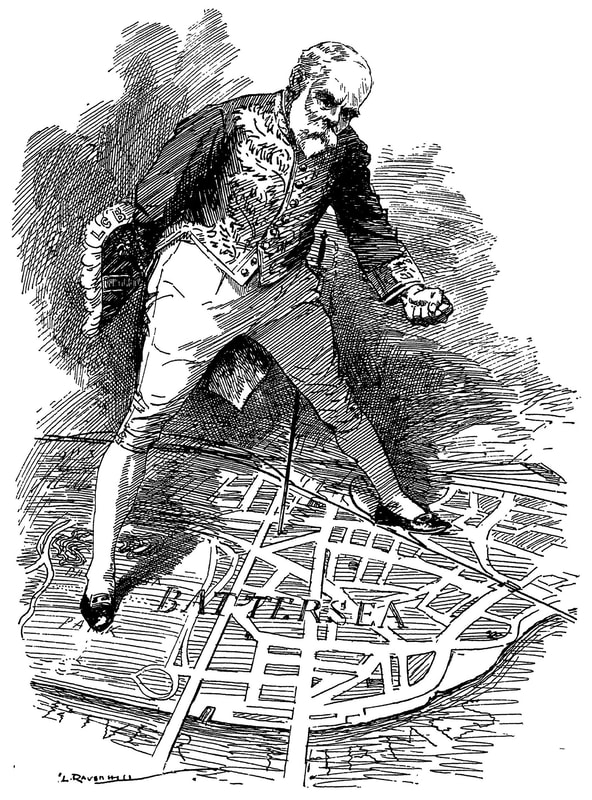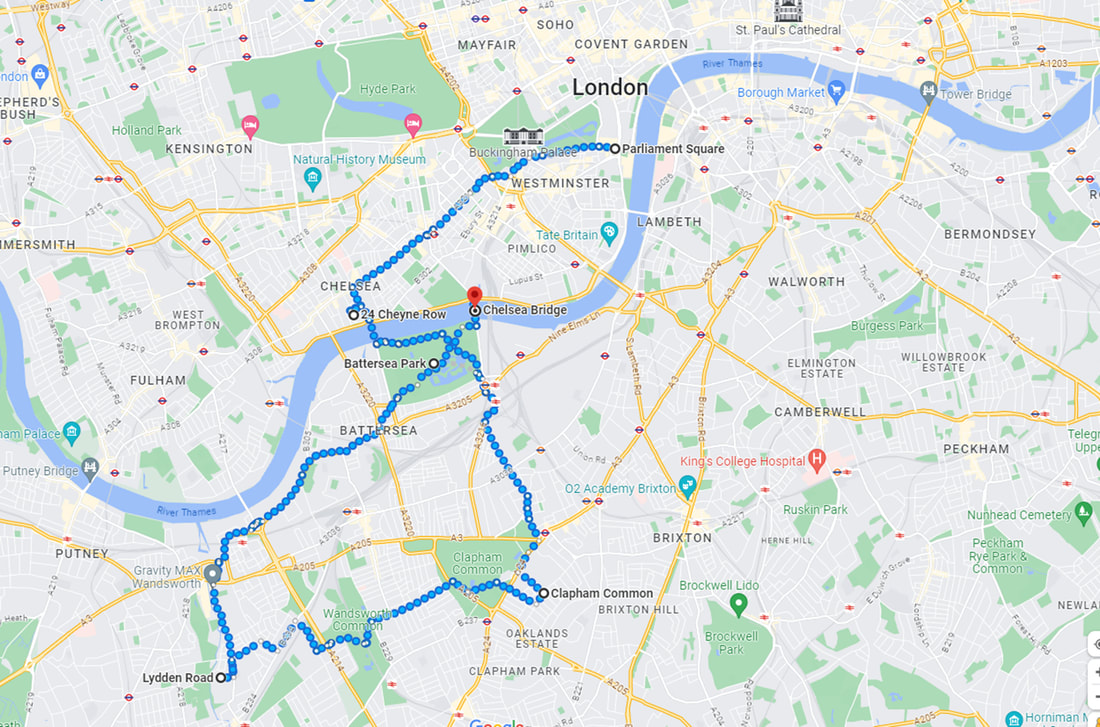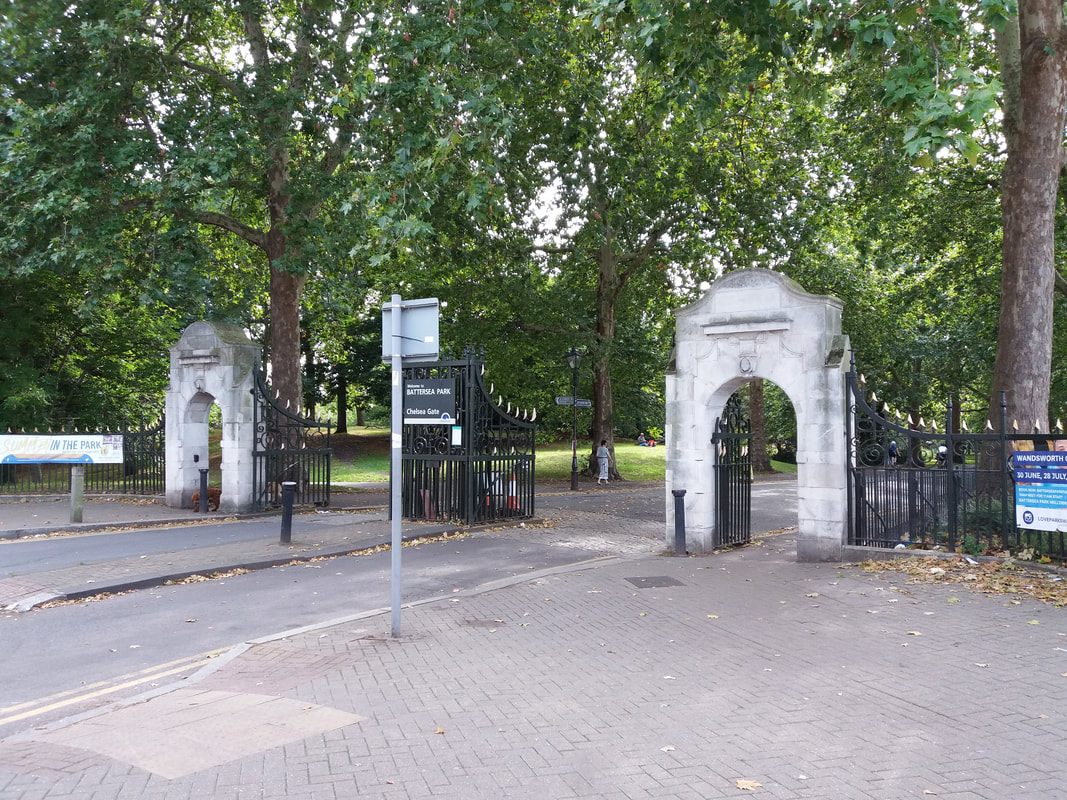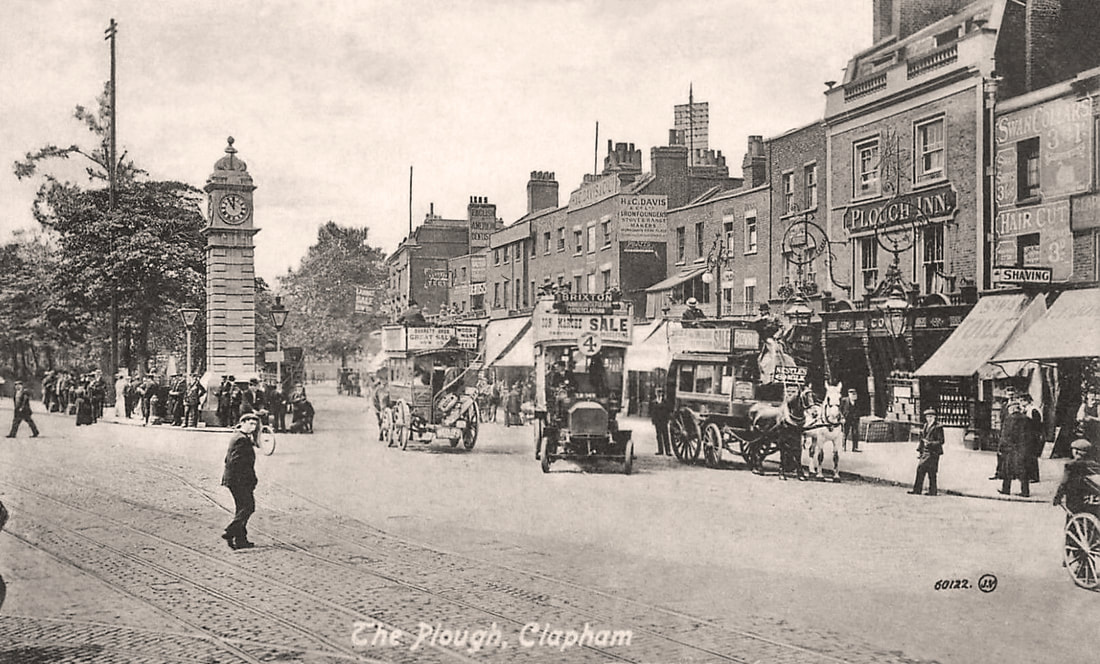A Day with John Burns from "The Man Farthest Down"
|
|
Date Published: October 15, 2023
|
Who was John Burns?
The Rt. Hon. John Burns was President of the London Local Government Board and the first laboring man to become a member of the British Cabinet. Booker T. Washington writes of John Burns in "The Man Farthest Down" that he: (1) was born in poverty and went to work at the age of ten, (2) organized the great dock laborers’ strike, which brought together 100,000 starving and disorganized workers into the protection of organized labor, (3) was elected to the first London County Council, where he worked side by side with such distinguished men as Frederic Harrison and Lord Rosebery, (4) was the first laboring man chosen a member of parliament, and (5) finally, in 1906, after successfully writing some one hundred labor laws into the acts of parliament, accepted the position of President of Local Government.
This was quite a day these two men—both of whom represented under-represented members of their societies, spent together touring the streets of London, .
Enjoy,
- Pete
The Rt. Hon. John Burns was President of the London Local Government Board and the first laboring man to become a member of the British Cabinet. Booker T. Washington writes of John Burns in "The Man Farthest Down" that he: (1) was born in poverty and went to work at the age of ten, (2) organized the great dock laborers’ strike, which brought together 100,000 starving and disorganized workers into the protection of organized labor, (3) was elected to the first London County Council, where he worked side by side with such distinguished men as Frederic Harrison and Lord Rosebery, (4) was the first laboring man chosen a member of parliament, and (5) finally, in 1906, after successfully writing some one hundred labor laws into the acts of parliament, accepted the position of President of Local Government.
This was quite a day these two men—both of whom represented under-represented members of their societies, spent together touring the streets of London, .
Enjoy,
- Pete
Chapter XIX: John Burns and the Man Farthest Down in London
Peter E. Greulich has added all images and section headings to this article. He has also performed some light editing. These additions and edits are his sole responsibility and his alone. If you would prefer an unedited copy of this chapter from “The Man Farthest Down,” the book is in the public domain and available in multiple places that cater to such needs.
Booker T. Washington’s Overview of the Life of John Burns
I had heard a good deal, from time to time, about John Burns before I went to Europe, and when I reached London, I took advantage of the first opportunity that offered to make my acquaintance with him a personal one. This meeting was a special good fortune to me at the time because, as I already knew, there is in all probability, no one in England who better understands the hopes, ambitions, and the prospects of the laboring classes than the Rt. Hon. John Burns, President of the Local Government Board, himself the first laboring man to become a member of the British Cabinet.
|
John Burns in 1911 from Wikimedia Commons.
|
John Burns was born in poverty and went to work at the age of ten. He had known what it is to wander the streets of London for weeks and months looking for work. He had an experience of that kind once after he had lost his job because he made a Socialistic speech.
Having learned by experience the life of that industrial outcast, he organized in 1889 the great dock laborers’ strike, which brought together into the labor unions 100,000 starving and disorganized laborers who had previously been shut out from the protection of organized labor. Besides that, he has been an agitator; was for years a marked man, and at one time gained for himself the name of the “man with the red flag.” He has been several times arrested for making speeches, and has once been imprisoned for three months on the charge of rioting. |
Meanwhile he had become the idol of the working masses and even won the admiration and respect of the leaders of public opinion. He was elected in 1889 to the first London County Council, where he worked side by side with such distinguished men as Frederic Harrison and Lord Rosebery. He was chosen a member of parliament in 1890, where he became distinguished for the store of practical information which he accumulated during his eighteen years of practical experience in the London County Council.
When he was twenty-one years of age Mr. Burns went as an engineer to Africa, where he spent a year among the swamps of the Lower Niger, occasionally fighting alligators and devoting his leisure to the study of political economy. When he returned, he spent the money he had saved in Africa in six months of travel and study in Europe.
Speaking of what he learned in Africa, Mr. Burns once said: “You talk of savagery and misery in heathen lands, but from my own experience I can tell you that there is more of all these, and more degradation of women, in the slums of London than you will see on the West Coast of Africa.”
When he was twenty-one years of age Mr. Burns went as an engineer to Africa, where he spent a year among the swamps of the Lower Niger, occasionally fighting alligators and devoting his leisure to the study of political economy. When he returned, he spent the money he had saved in Africa in six months of travel and study in Europe.
Speaking of what he learned in Africa, Mr. Burns once said: “You talk of savagery and misery in heathen lands, but from my own experience I can tell you that there is more of all these, and more degradation of women, in the slums of London than you will see on the West Coast of Africa.”
Booker T. Washington’s Overview of the Politics and Administration of John Burns
|
He has had a wider experience than most men with mobs, for he has not only led them, but in 1900 he defended himself with a cricket bat for two days in his home on Lavender Hill, Battersea, against a mob said to number 10,000 which hurled stones through the windows and tried to batter down the door of his house because he had denounced the Boer War in parliament.
In 1906, after he had been successful in writing something like one hundred labor laws into the acts of parliament, he accepted the position of President of Local Government and then became, as I have said, the first laboring man to accept a place in the British Cabinet. In reply to the criticisms which were offered when he accepted this high and responsible post in the government, Mr. Burns said: “I had to choose whether, for the next ten years, I should indulge, perhaps, in the futility of faction, possibly in the impotence of intrigue, or whether I should accept an office which in our day and generation I can make useful of good works.” I have noted this statement because this is a choice which most reformers and agitators have to make sooner or later. |
Chapter XIX: John Burns: Extracted from Booker T. Washington’s “The Man Farthest Down.”
|
He recognized, as he said, that “the day of the agitator was declining and that of the administrator had begun,” and he did not shrink from accepting a position where he became responsible for administering laws he had helped to make. In his present position as the head of the Local Government Board, Mr. Burns is probably doing more than any other man to improve the situation of the poor man in London and in the other large cities of England.
It is a rare thing for a man who began life in poverty to find himself in middle life in a position of such power and usefulness as the head of one great branch of the British Government occupies. It is still more remarkable, however, that a man who began life as an agitator, the representative of the unemployed, the most helpless and unfortunate class in the community, should find himself, a comparatively few years later, charged with the task of carrying into effect the reforms which he had preached from the prisoner’s dock in a police court. It is all the more fortunate for England that the Government has found a man with these qualifications, who has at the same time the training and qualities of a statesman, to carry the reforms into effect. As Mr. Burns himself once said: “Depend upon it, there are no such places for making a public man as Pentonville Prison and the London County Council.”
To me, however, the most surprising thing about it all is that a man with his history and qualifications should have found his way, by the ordinary methods of politics, into a position he is so well fitted to fill. It suggests to me that, in spite of all the misery that one still may see in London, in England, at least, there is hope for the man farthest down.
It is a rare thing for a man who began life in poverty to find himself in middle life in a position of such power and usefulness as the head of one great branch of the British Government occupies. It is still more remarkable, however, that a man who began life as an agitator, the representative of the unemployed, the most helpless and unfortunate class in the community, should find himself, a comparatively few years later, charged with the task of carrying into effect the reforms which he had preached from the prisoner’s dock in a police court. It is all the more fortunate for England that the Government has found a man with these qualifications, who has at the same time the training and qualities of a statesman, to carry the reforms into effect. As Mr. Burns himself once said: “Depend upon it, there are no such places for making a public man as Pentonville Prison and the London County Council.”
To me, however, the most surprising thing about it all is that a man with his history and qualifications should have found his way, by the ordinary methods of politics, into a position he is so well fitted to fill. It suggests to me that, in spite of all the misery that one still may see in London, in England, at least, there is hope for the man farthest down.
Booker T. Washington’s Day Touring London with John Burns
|
The portrayal of John Burns by Booker T. Washington in “The Farthest Man Down” written in 1911 is much kinder than this depiction in this artist’s drawing from December 1909 … from Wikimedia Commons.
|
It is not my purpose in this chapter to write a biography of John Burns, but rather to describe what I saw, under his direction, of what has already been done in London in the work of “reconstruction,” to which I have already referred. It seemed to me, however, that it was not out of place to say something, by way of introduction, in regard to the man who is, perhaps, as much if not more than anyone else responsible for the work now going on, and whose life is connected in a peculiar way with that part of the city I had opportunity to visit, and with the improvements that have been made there.
John Burns was born and still lives in Battersea, a quarter of the city inhabited, for the most part, by artisans, mechanics, and laborers of various kinds, with a sprinkling of gypsy peddlers and the very poor. Battersea is directly across the river from, and in plain sight of, the Parliament Buildings, and there is a story to the effect that, as he was coming home one winter night, helping his mother carry home the washing by which she supported herself and family, they two stopped within the shadow of those buildings to rest. Turning to his mother the boy said: “Mother, if ever I have health and strength no mother shall have to work as you do.” John Burns has health and strength, and is now making a brave effort to keep that promise to his mother. |
Aside from Colonel Roosevelt, I do not think I ever saw a man who seemed his equal in vigor of mind and body; who seemed able to compress so much into a short space of time; or one who goes at the task before him with a greater zest. In all England I do not believe there is a man who works harder, accomplishes more for the good of his country and the world, or one who is happier in the work he is doing.
I found him late in August, when everyone else connected with the government had left London on their vacation, buried deep in the details and concerns of his office but chockfull of energy and enthusiasm.
What John Burns is doing, and the spirit in which he is doing it, will, perhaps, appear in the course of my description of a trip which I took with him through his own district of Battersea and the region adjoining it in order to see what the London County Council is doing there to make the life of the poor man better. I am sorry that I will not be able to describe in detail all that I saw on that trip, because we covered in a short time so much ground, and saw so many different things, that it was not until I had returned to my hotel, and had an opportunity to study out the route of that journey, that I was able to get any definite idea of the direction in which we had gone or of the connection and general plan which underlay the whole scheme of the improvements we had seen.
I found him late in August, when everyone else connected with the government had left London on their vacation, buried deep in the details and concerns of his office but chockfull of energy and enthusiasm.
What John Burns is doing, and the spirit in which he is doing it, will, perhaps, appear in the course of my description of a trip which I took with him through his own district of Battersea and the region adjoining it in order to see what the London County Council is doing there to make the life of the poor man better. I am sorry that I will not be able to describe in detail all that I saw on that trip, because we covered in a short time so much ground, and saw so many different things, that it was not until I had returned to my hotel, and had an opportunity to study out the route of that journey, that I was able to get any definite idea of the direction in which we had gone or of the connection and general plan which underlay the whole scheme of the improvements we had seen.
- The John Burns Reveals a London Saga
It was about two o’clock in the afternoon when we left the offices of the Local Government Board. Mr. Burns insisted that, before we started, I should see something of the Parliament Buildings, and he promised to act as my guide. This hasty trip through the Parliament Buildings served to show me that John Burns, although he had entered political life as a Socialist, has a profound reverence for all the historic traditions and a very intimate knowledge of English history.
I shall not soon forget the eloquent and vivid manner in which he summoned up for me, as we passed through Westminster Hall, on the way to the House of Commons, some of the great historical scenes and events which had taken place in that ancient and splendid room. I was impressed not only by the familiarity which he showed with all the associations of the place, but I was thrilled by the enthusiasm with which he spoke of and described them. It struck me as very strange that the same John Burns once known as “the man with the red flag,” who had been imprisoned for leading a mob of workmen against the police, should be quoting history with all the enthusiasm of a student and a scholar.
In the course of our journey we passed through a small strip of Chelsea. I remember that among the other places we passed he pointed out the home of Thomas Carlyle. I found that he was just as familiar with the names and deeds of all the great literary persons who had lived in that quarter of London as he was with the political history.
I shall not soon forget the eloquent and vivid manner in which he summoned up for me, as we passed through Westminster Hall, on the way to the House of Commons, some of the great historical scenes and events which had taken place in that ancient and splendid room. I was impressed not only by the familiarity which he showed with all the associations of the place, but I was thrilled by the enthusiasm with which he spoke of and described them. It struck me as very strange that the same John Burns once known as “the man with the red flag,” who had been imprisoned for leading a mob of workmen against the police, should be quoting history with all the enthusiasm of a student and a scholar.
In the course of our journey we passed through a small strip of Chelsea. I remember that among the other places we passed he pointed out the home of Thomas Carlyle. I found that he was just as familiar with the names and deeds of all the great literary persons who had lived in that quarter of London as he was with the political history.
Although, it is impossible to know the exact route that Booker T. Washington and John Burns took as mentioned in “The Man Farthest Down,” this map captures some of the key areas described by Mr. Washington on their journey.
When he afterward told me that he had had very little education in school, because he had been compelled to go to work when he was ten years of age, I asked him how he had since found time, in the course of his busy life, to gain the wide knowledge of history and literature which he evidently possessed.
“You see,” he replied, with a quiet smile,· “I earned my living for a time as a candle maker and I have burned a good many candles at night ever since.”
Mr. Burns had promised to show me, within the space of a few hours, examples of the sort of work which is now going on in every part of London. A few years ago, on the site of an ancient prison, the London County Council erected several blocks of workingmen’s tenements. These were, I believe, the first, or nearly the first, of the tenements erected by the city in the work of clearing away unsanitary areas and providing decent homes for the working classes.
It was to these buildings, in which a population of about 4,000 persons live, that we went first. The buildings are handsome brick structures, well lighted, with wide, open, brick-paved courts between the rows of houses, so that each block looked like a gigantic letter H with the horizontal connecting line left out.
Of course, these buildings were, as someone said, little more than barracks compared with the houses that are now being erected for laboring people in some of the London suburbs, but they are clean and wholesome and, to anyone familiar with the narrow, grimy streets in the East End of London, it was hard to believe that they stood in the midst of a region which a few years ago had been a typical London slum.
A little farther on we crossed the river and entered what Mr. Burns referred to as “my own district,” Battersea, where he was born and where he has lived and worked all his life, except for one year spent as an engineer in Nigeria, Africa.
“You see,” he replied, with a quiet smile,· “I earned my living for a time as a candle maker and I have burned a good many candles at night ever since.”
Mr. Burns had promised to show me, within the space of a few hours, examples of the sort of work which is now going on in every part of London. A few years ago, on the site of an ancient prison, the London County Council erected several blocks of workingmen’s tenements. These were, I believe, the first, or nearly the first, of the tenements erected by the city in the work of clearing away unsanitary areas and providing decent homes for the working classes.
It was to these buildings, in which a population of about 4,000 persons live, that we went first. The buildings are handsome brick structures, well lighted, with wide, open, brick-paved courts between the rows of houses, so that each block looked like a gigantic letter H with the horizontal connecting line left out.
Of course, these buildings were, as someone said, little more than barracks compared with the houses that are now being erected for laboring people in some of the London suburbs, but they are clean and wholesome and, to anyone familiar with the narrow, grimy streets in the East End of London, it was hard to believe that they stood in the midst of a region which a few years ago had been a typical London slum.
A little farther on we crossed the river and entered what Mr. Burns referred to as “my own district,” Battersea, where he was born and where he has lived and worked all his life, except for one year spent as an engineer in Nigeria, Africa.
|
The great breathing place for the people of this region is Battersea Park, and as we sped along the edge of this beautiful green space, stopping to look for a moment at the refreshment booths on the cricket grounds, or to speak to a group of well-dressed boys going from school to the playgrounds, Mr. Burns interspersed his information about workmen’s wages, the price of rents, and the general improvement of the laboring classes with comment on the historic associations of the places we passed.
Where Battersea Park now stands there was formerly a foul and unwholesome swamp. Near here the Duke of Wellington had fought a duel with the Earl of Winchelsea, and a little farther up Julius Caesar, nearly two thousand years ago, forded the river with one of his legions. |
Battersea Park at Chelsea Gate from Wikimedia Commons.
|
- “Johnny” Burns was known and respected by his constituents
It was a happy and novel experience to observe the pleasure which Mr. Burns took in pointing out the improvement in the people, in the dwellings, and in the life of the people generally, and to note, in turn, the familiar and cheerful way with which all sorts of people we met on the streets greeted him as we passed.
“Hello, Johnny Burns!” a group of schoolboys would call as we went by. Once we passed by a group of some fifteen or twenty working women sitting in one of the refreshment booths, drinking their afternoon tea and, apparently, holding a neighborhood meeting of some kind or other. As they recognized the man who, as member of the London County Council, had been responsible for most of the improvements that had been made in the homes and surroundings in which they lived, they stood up and waved their handkerchiefs, and even attempted a faint and feminine “Hurrah for Johnny Burns.”
There are 150,000 people in Battersea, but Mr. Burns seemed to be acquainted with every one of them, and when he wanted to show me the inside of some of the new “County Council houses,” as they are called, did not hesitate to knock at the nearest door, where we were gladly welcomed. The people seemed to be just as proud of their new houses, and of Mr. Burns, as he was of them.
The houses which we visited were, some of them, no more than three or four rooms, but each one of them was as neat and wholesome as if it had been a palace. They were very compactly built, but provided with every sort of modern convenience, including electric lights and baths. There were houses of five and six rooms intended for clerks and small business men, which rented for a pound a week, and there were cheaper houses, for ordinary laboring people, which rented for two dollars per week. These houses are built directly under the direction of the London County Council, and are expected to pay 3 per cent upon the investment, after completion.
The London County Council was not the first to make the experiment of building decent and substantial houses for the laboring classes. Some thirty years before, on what is known as the Shaftbury Park Estate, 1,200 houses, which provide homes for eleven thousand people, were erected and the investment had been made to pay.
I looked down the long lanes of little vine-covered buildings which make up this estate. It seemed as if some great army had settled on the land and built permanent quarters.
These labor colonies were interesting, not merely for the improvement they had made in the lives of a large section of the people living in this part of the city, but as the forerunner of those garden cities which private enterprise has erected at places like Port Sunlight, near Liverpool; Bourneville, in the outskirts of Birmingham, and at Letchworth, thirty-four miles from London.
“Hello, Johnny Burns!” a group of schoolboys would call as we went by. Once we passed by a group of some fifteen or twenty working women sitting in one of the refreshment booths, drinking their afternoon tea and, apparently, holding a neighborhood meeting of some kind or other. As they recognized the man who, as member of the London County Council, had been responsible for most of the improvements that had been made in the homes and surroundings in which they lived, they stood up and waved their handkerchiefs, and even attempted a faint and feminine “Hurrah for Johnny Burns.”
There are 150,000 people in Battersea, but Mr. Burns seemed to be acquainted with every one of them, and when he wanted to show me the inside of some of the new “County Council houses,” as they are called, did not hesitate to knock at the nearest door, where we were gladly welcomed. The people seemed to be just as proud of their new houses, and of Mr. Burns, as he was of them.
The houses which we visited were, some of them, no more than three or four rooms, but each one of them was as neat and wholesome as if it had been a palace. They were very compactly built, but provided with every sort of modern convenience, including electric lights and baths. There were houses of five and six rooms intended for clerks and small business men, which rented for a pound a week, and there were cheaper houses, for ordinary laboring people, which rented for two dollars per week. These houses are built directly under the direction of the London County Council, and are expected to pay 3 per cent upon the investment, after completion.
The London County Council was not the first to make the experiment of building decent and substantial houses for the laboring classes. Some thirty years before, on what is known as the Shaftbury Park Estate, 1,200 houses, which provide homes for eleven thousand people, were erected and the investment had been made to pay.
I looked down the long lanes of little vine-covered buildings which make up this estate. It seemed as if some great army had settled on the land and built permanent quarters.
These labor colonies were interesting, not merely for the improvement they had made in the lives of a large section of the people living in this part of the city, but as the forerunner of those garden cities which private enterprise has erected at places like Port Sunlight, near Liverpool; Bourneville, in the outskirts of Birmingham, and at Letchworth, thirty-four miles from London.
- Investing in Families and Children: The hope of the future
Not far from Battersea Park, and in a part of the city which was formerly inhabited almost wholly by the very poor, we visited the public baths and a public washhouse where, during the course of a year, 42,000 women come to wash their clothes, paying at the rate of three cents an hour for the use of the municipal tubs and hot water. Children pay a penny or two cents for the use of the public baths. The building is also provided with a gymnasium for the use of the children in winter, and contains a hall which is rented to workingmen’s clubs at a nominal price.
What pleased me most was to see the orderly way in which the children had learned to conduct themselves in these places, which, as was evident, had become not merely places for recreation, but at the same time schools of good manners.
We passed on the streets, groups of neatly-dressed, well-bred looking boys with their books slung over their arms, going home from school or making their way to the park. Mr. Burns was delighted at the sight of these clean-cut, manly looking fellows.
“Look at those boys, Mr. Washington,” he would exclaim, as he pointed proudly to one or another of these groups. “Isn’t that doing pretty well for the proletariat?”
Then he would leap out of the automobile, before the driver could stop, put his arm around the boy nearest him and, in a moment, come back triumphant with the confirmation of his statement that the boy’s father was, as he had said, only a small clerk or a letter carrier, or, perhaps, the son of a common laborer, a navvy [a person who is employed to do hard physical work, for example building roads or canals].
When I contrasted the appearance of these well-dressed and well-behaved boys with some of those I had seen elsewhere, with the children who attend the so-called “ragged” schools, for example, I understood and shared his enthusiasm.
What pleased me most was to see the orderly way in which the children had learned to conduct themselves in these places, which, as was evident, had become not merely places for recreation, but at the same time schools of good manners.
We passed on the streets, groups of neatly-dressed, well-bred looking boys with their books slung over their arms, going home from school or making their way to the park. Mr. Burns was delighted at the sight of these clean-cut, manly looking fellows.
“Look at those boys, Mr. Washington,” he would exclaim, as he pointed proudly to one or another of these groups. “Isn’t that doing pretty well for the proletariat?”
Then he would leap out of the automobile, before the driver could stop, put his arm around the boy nearest him and, in a moment, come back triumphant with the confirmation of his statement that the boy’s father was, as he had said, only a small clerk or a letter carrier, or, perhaps, the son of a common laborer, a navvy [a person who is employed to do hard physical work, for example building roads or canals].
When I contrasted the appearance of these well-dressed and well-behaved boys with some of those I had seen elsewhere, with the children who attend the so-called “ragged” schools, for example, I understood and shared his enthusiasm.
- The History and Temperance of John Burns
|
From Battersea Park we went to Clapham Common and, as we were speeding along through what appeared to be a quarter of well to-do artisans’ homes, Mr. Burns nodded casually in the direction of a little vine-clad cottage and said:
“That is where I live.’’ Although Mr. Burns now occupies one of the highest positions in the British Government, in which he has a salary of $10,000 a year, he has not yet assumed the high hat and the long tailed coat which are the recognized uniform in London of a gentleman. |
Clapham Common in the 1900s from Wikimedia Commons
|
On the contrary, he wears the same blue reefer coat and soft felt hat, speaks the same language, lives in the same style, and is apparently in every respect the same man that he was when he was living on the $25 a week guaranteed him by the Battersea Labor League when he entered parliament. He is still a laboring man and proud of the class to which he belongs.
It was at Clapham Common, although Mr. Burns did not mention this fact, that he was arrested for the first time, away back in 1878, for making a public speech. It was somewhere in this region also, if I remember rightly, that Mr. Burns pointed out to us a private estate on which 3,000 houses of the cheaper class had been erected.
“And mind you, there is no public house,” said Mr. Burns. Instead he showed us a brand new temperance billiard hall which had been erected to compete with, and take the place of, the bar-rooms which have disappeared.
At Lower Tooting, an estate of some thirty 375 eight acres, the London County Council is building outright a city of something like 5,000 inhabitants, laying out the streets, building the houses, even putting a tidy little flower garden in each separate front door yard. It was as if the London County Council had gone to playing dolls, so completely planned and perfectly carried out in every detail is this little garden city.
Mr. Burns, who has all his life been an advocate of temperance, although he had once served as pot-boy in a public house, pointed out here, as he did elsewhere, that there was no public house.
In the building of this little paradise all the architectural and engineering problems had indeed been solved. There remained, however, the problem of human nature, and the question that I asked myself was: Will these people be able to live up to their surroundings?
It was at Clapham Common, although Mr. Burns did not mention this fact, that he was arrested for the first time, away back in 1878, for making a public speech. It was somewhere in this region also, if I remember rightly, that Mr. Burns pointed out to us a private estate on which 3,000 houses of the cheaper class had been erected.
“And mind you, there is no public house,” said Mr. Burns. Instead he showed us a brand new temperance billiard hall which had been erected to compete with, and take the place of, the bar-rooms which have disappeared.
At Lower Tooting, an estate of some thirty 375 eight acres, the London County Council is building outright a city of something like 5,000 inhabitants, laying out the streets, building the houses, even putting a tidy little flower garden in each separate front door yard. It was as if the London County Council had gone to playing dolls, so completely planned and perfectly carried out in every detail is this little garden city.
Mr. Burns, who has all his life been an advocate of temperance, although he had once served as pot-boy in a public house, pointed out here, as he did elsewhere, that there was no public house.
In the building of this little paradise all the architectural and engineering problems had indeed been solved. There remained, however, the problem of human nature, and the question that I asked myself was: Will these people be able to live up to their surroundings?
- John Burns: A Plain Speaking and Honest Man
It is fortunate, in this connection, that in Mr. Burns the inhabitants have a leader who dares to speak plainly to them of their faults as well as their virtues and who is able, at the same time, to inspire them with an ambition and enthusiasm for the better life which is opened to them. Engineering and architecture cannot do everything, but education, leadership of the right sort, may complete what these have begun.
At Warden Street and Lydden Road, on our way back to the city, we stopped to look for a moment at what Mr. Burns said was the most wretched part of the population in that quarter of the city. The houses were two-story dwellings, with the sills flush with the pavement, in front of which groups of lounging idle men and women stood or squatted on the pavement. A portion of the street was given up to gypsy vans, and the whole population was made up, as I learned, of peddlers and pushcart venders, a class of people who, in the very center of civilization, manage somehow to maintain a nomadic and half-barbarous existence, wandering from one place to another with the seasons, living from hand to mouth, working irregularly and not more than half the time.
A little farther on we passed by the Price candle factory, “where I began work at a dollar a week,” said Mr. Burns in passing. A group of workmen were just coming from the factory as we passed, and the men recognized Mr. Burns and shouted to him as he passed.
Then we drove on back across the Chelsea Bridge and along the river to the Parliament Buildings again. “Now,” said Mr. Burns at the end of our journey, “you have seen a sample of what London is doing for its laboring population. If you went further, you would see more, but little that is new or different.”
At Warden Street and Lydden Road, on our way back to the city, we stopped to look for a moment at what Mr. Burns said was the most wretched part of the population in that quarter of the city. The houses were two-story dwellings, with the sills flush with the pavement, in front of which groups of lounging idle men and women stood or squatted on the pavement. A portion of the street was given up to gypsy vans, and the whole population was made up, as I learned, of peddlers and pushcart venders, a class of people who, in the very center of civilization, manage somehow to maintain a nomadic and half-barbarous existence, wandering from one place to another with the seasons, living from hand to mouth, working irregularly and not more than half the time.
A little farther on we passed by the Price candle factory, “where I began work at a dollar a week,” said Mr. Burns in passing. A group of workmen were just coming from the factory as we passed, and the men recognized Mr. Burns and shouted to him as he passed.
Then we drove on back across the Chelsea Bridge and along the river to the Parliament Buildings again. “Now,” said Mr. Burns at the end of our journey, “you have seen a sample of what London is doing for its laboring population. If you went further, you would see more, but little that is new or different.”
Chapter XIX: John Burns and the Man Farthest Down in London
Booker T. Washington, The Man Farthest Down, 1911
Booker T. Washington, The Man Farthest Down, 1911
